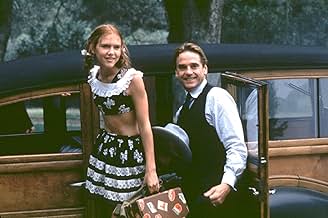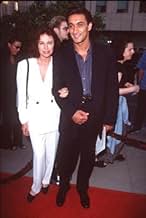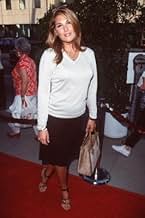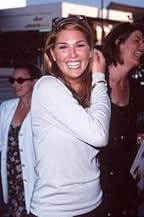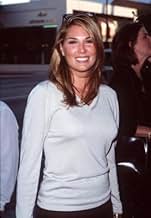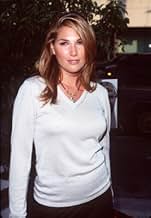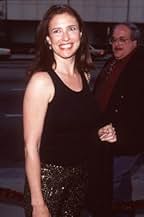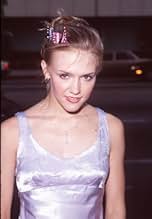An English professor falls for a minor, and has to face the consequences of his actions.An English professor falls for a minor, and has to face the consequences of his actions.An English professor falls for a minor, and has to face the consequences of his actions.
- Director
- Writers
- Stars
- Awards
- 2 wins & 4 nominations total
Pat Pierre Perkins
- Louise
- (as Pat P. Perkins)
Emma Griffiths Malin
- Annabel Lee
- (as Emma Griffiths-Malin)
- Director
- Writers
- All cast & crew
- Production, box office & more at IMDbPro
Featured reviews
I implore you to read the book before watching the movie, and then you'll understand that it isn't glorifying anything. Yes the movie's aesthetic is beautiful. There are nice shots of the US and Lolita's style is pretty. But the story is nothing short of sick. Humbert is not meant to be the hero. He is an insanely sick and twisted. The author mocks him many times in the book. The story is told from his perspective which is interesting, but he is not a trustworthy narrator. He justifies his actions when in reality we see how they start to pile up on him and not work out in his favour. He is selfishly trying to pursue a fantasy, and putting adult expectations on a literal child. Lolita is manipulative, but she never stood a chance. She was failed by the adults around her. And she was dealing with a lot. Her father is nowhere to be found and we see how Humbert inserts himself into that role to abuse her. The aftermath of the characters, revealed right before the credits, is tragic. The actors delivered amazingly. And the poetic writing from the book is used throughout. This is a messed up story told from the perspective of a pathetic individual, but has elements of dark humour. We can see we are not supposed to root for Humbert. I think it was a great adaptation of the book.
When the 1997 version of Lolita was widely censored in the US, many asked why the reaction was so strong to this film. After all, the novel was published in the US in 1958, Kubrick's film version appeared in 1962, and we hear more shocking tales of sexual depravity every day on the daytime talk shows. But after seeing Lyne's brilliant version of Lolita, I can see how he manages to breathe fresh controversy into this familiar story. Lyne's lascivious lens eroticizes Lolita's every movement and pose. The viewer is forced to see her through the eyes of Humbert and to feel his obsession and desire. We are co-conspirators in his crime, and at the end we share his shame. Rather than shocking us (and having us pull away in revulsion), Lyne draws us in and makes us face the Humbert in ourselves. This is an incredibly powerful film.
Having read the book and watched the 1962 version some years back, now watching the 1997 version completes my own Lolita experience. This one also pretty well follows the novel but of course some things just are inappropriate to include. Lolita is a brat, sassy, pretty, flirty, manipulative, but Humbert is obsessed. Near the end, before his final encounter with Quilty he goes on about loving Lolita, but what he had was not love, it was carnal obsession. It wrecked him I suppose in the same way that many men have been wrecked over the history of the world.
I found it on Amazon streaming movies.
I found it on Amazon streaming movies.
The Author would be dismayed, and precisely because the story is so faithful to the book. But the story in the book was incidental, just something on which Nabokov could hang his layered challenges to concepts of narrative. The narrator is crazy, overly colors and outright lies. The story never fully exists in the book at all, and such as it does one can never be sure what is true and what imagined. Humbert is a made up name (as are all names) and clearly the narrator makes up most of the elements of his own character as well (European, Professor, Author... obviously a joke by the narrator on Nabokov).
In this film, everything makes sense, exactly the opposite of the reason the book exists. This is a beautiful film, with lovely detailed cinematography, good acting and great score, and all to solidify something that Nabokov created such that it could not be so. I believe that Peter Greenaway could make a good film of Lolita, and that he would have the courage to make it confusing and unerotic and unresolved. Why does Dolores' fate have to change in the film's epilogue? Because it ties up every last loose end. On Christmas Day no less!
(The real scandal is not that audiences/censors are shocked by prurient subjects, but that they take one of the greatest literary achievements ever and make it "explainable." Is this the only thing we can accept?)
But take the film on its own presumption that the book's story is what matters. This Lolita is too old, too pretty and sexy, too controlling. Irons is clearly narrowly channeled here and he is smart enough to know it: his frustration with the unimaginative stance of the film translates to a frustrated Humbert. I think Melanie is just right (just because HH calls her a cow means nothing). HH's violence with his previous wife should have been mentioned; her running away with the Russian cabbie is as much a setup for the Lolita fixation as the childhood dalliance, and better justifies the angst of loss. There should have been a few butterflies, and some explanation about the play: that it was written to allude to that first night at the hotel.
I highly recommend the audio tape version of Lolita. It is read by (guess...) Jeremy Irons! What he brings to the audio tape is the voice and phrasing of a man in a cell continually going over things in his own mind, embellishing and exaggerating and confusing and speculating and sometimes not at all sure about any of it. He brings this same voice to the voiceovers in the film, but it conflicts with the images which purport to represent a narrative stance of "real truth".
In this film, everything makes sense, exactly the opposite of the reason the book exists. This is a beautiful film, with lovely detailed cinematography, good acting and great score, and all to solidify something that Nabokov created such that it could not be so. I believe that Peter Greenaway could make a good film of Lolita, and that he would have the courage to make it confusing and unerotic and unresolved. Why does Dolores' fate have to change in the film's epilogue? Because it ties up every last loose end. On Christmas Day no less!
(The real scandal is not that audiences/censors are shocked by prurient subjects, but that they take one of the greatest literary achievements ever and make it "explainable." Is this the only thing we can accept?)
But take the film on its own presumption that the book's story is what matters. This Lolita is too old, too pretty and sexy, too controlling. Irons is clearly narrowly channeled here and he is smart enough to know it: his frustration with the unimaginative stance of the film translates to a frustrated Humbert. I think Melanie is just right (just because HH calls her a cow means nothing). HH's violence with his previous wife should have been mentioned; her running away with the Russian cabbie is as much a setup for the Lolita fixation as the childhood dalliance, and better justifies the angst of loss. There should have been a few butterflies, and some explanation about the play: that it was written to allude to that first night at the hotel.
I highly recommend the audio tape version of Lolita. It is read by (guess...) Jeremy Irons! What he brings to the audio tape is the voice and phrasing of a man in a cell continually going over things in his own mind, embellishing and exaggerating and confusing and speculating and sometimes not at all sure about any of it. He brings this same voice to the voiceovers in the film, but it conflicts with the images which purport to represent a narrative stance of "real truth".
Nabokov's best novel save for Pale Fire will probably never get an "ideal" filming, unless someone decides to actually commit Nabokov's own script to celluloid (he wrote it for the 1962 version, and his name appears in the credits, but the finished product was almost wholly the product of Kubrick's pen and Peter Sellers' ad-libbing). But I like both the Kubrick and the Lyne versions, with reservations.
With Kubrick's, the only real problem is that it's not Nabokov. James Mason's performance contains the core of an accurate portrayal of Humbert, and he's often moving. But Sue Lyon was too old for her part and Sellers' Quilty is an altogether different conception from the author's (not that he isn't lots of fun). The film also suffers from having been filmed in the UK. Nabokov had a complex vision of America - vast, tacky, seductive, and grindingly mundane all at the same time - and this just can't be conveyed in a studio and with a few well-chosen locations.
That's where Lyne's version excels. His compositions (or his cinematographer's) are indeed beautiful to look at, and (I think) capture suburban and roadside America very much the way Humbert would have experienced them. Irons is fine as Humbert, although the typecasting was initially painful to contemplate, and Swain is a vast improvement over Lyon as young Dolores: still a bit too old for the part (an inevitable problem, perhaps, for anyone who wants to film this book), but her intelligent performance makes up for this. Despite his cheesy reputation, Lyne wisely refrains from making his Lolita a teenage bombshell, something the more artistic Kubrick couldn't resist.
Again, however, the problem is Quilty. Both directors obviously felt compelled to render in three dimensions a character who is one of Nabokov's phantoms: Does he really exist? Who is he and what do we know about him, outside of Humbert's increasingly paranoid imaginings? Can we trust anything at all that's said about him in this book? I expect that Nabokov himself regretted having to bring Quilty out of the shadows at all for the denouement.
Sellers carried off the role with style, making you forget for a moment that his routines seem to have wandered in from another film. Lyne turns the final confrontation between Humbert and Quilty (there is no flashback framing device, as in Kubrick) into pure Grand Guignol, and so we have to endure watching poor, paunchy Frank Langella running down a hallway of his ridiculously overstuffed house, his bathrobe falling open to reveal his endowments to our embarrassed gaze before being blown away Dirty Harry-style by the avenging Humbert. A major wrong note to say the least.
So Quilty, in the end, defeats both of Nabokov's filmic approximators. But if you love the book, see both movies: Kubrick and Lyne each capture different aspects of the master's great story in valuable ways, and the new Lolita is clearly Lyne's best work yet, proving that a great novel can inspire excellent filmmaking, if not guarantee an "ideal" adaptation.
What we really need now, however, is not a third version of Lolita, but finally, a filming of Lolita: A Screenplay. Nabokov had fun writing this, and any fan of his should read his script as well. Wouldn't you like to see a move of Lolita in which Humbert, searching through the woods for his Lo, encounters a butterfly collector named Vladimir Nabokov? Of course you would!
With Kubrick's, the only real problem is that it's not Nabokov. James Mason's performance contains the core of an accurate portrayal of Humbert, and he's often moving. But Sue Lyon was too old for her part and Sellers' Quilty is an altogether different conception from the author's (not that he isn't lots of fun). The film also suffers from having been filmed in the UK. Nabokov had a complex vision of America - vast, tacky, seductive, and grindingly mundane all at the same time - and this just can't be conveyed in a studio and with a few well-chosen locations.
That's where Lyne's version excels. His compositions (or his cinematographer's) are indeed beautiful to look at, and (I think) capture suburban and roadside America very much the way Humbert would have experienced them. Irons is fine as Humbert, although the typecasting was initially painful to contemplate, and Swain is a vast improvement over Lyon as young Dolores: still a bit too old for the part (an inevitable problem, perhaps, for anyone who wants to film this book), but her intelligent performance makes up for this. Despite his cheesy reputation, Lyne wisely refrains from making his Lolita a teenage bombshell, something the more artistic Kubrick couldn't resist.
Again, however, the problem is Quilty. Both directors obviously felt compelled to render in three dimensions a character who is one of Nabokov's phantoms: Does he really exist? Who is he and what do we know about him, outside of Humbert's increasingly paranoid imaginings? Can we trust anything at all that's said about him in this book? I expect that Nabokov himself regretted having to bring Quilty out of the shadows at all for the denouement.
Sellers carried off the role with style, making you forget for a moment that his routines seem to have wandered in from another film. Lyne turns the final confrontation between Humbert and Quilty (there is no flashback framing device, as in Kubrick) into pure Grand Guignol, and so we have to endure watching poor, paunchy Frank Langella running down a hallway of his ridiculously overstuffed house, his bathrobe falling open to reveal his endowments to our embarrassed gaze before being blown away Dirty Harry-style by the avenging Humbert. A major wrong note to say the least.
So Quilty, in the end, defeats both of Nabokov's filmic approximators. But if you love the book, see both movies: Kubrick and Lyne each capture different aspects of the master's great story in valuable ways, and the new Lolita is clearly Lyne's best work yet, proving that a great novel can inspire excellent filmmaking, if not guarantee an "ideal" adaptation.
What we really need now, however, is not a third version of Lolita, but finally, a filming of Lolita: A Screenplay. Nabokov had fun writing this, and any fan of his should read his script as well. Wouldn't you like to see a move of Lolita in which Humbert, searching through the woods for his Lo, encounters a butterfly collector named Vladimir Nabokov? Of course you would!
Did you know
- TriviaAs Dominique Swain was a minor at age 15 when the movie was filmed, an adult body double had to be used for most of the sex scenes.
- GoofsCharlotte threatens to "ground" Lolita. Though the term was known to airmen it would not assume its current familiar meaning for many years.
- Quotes
[first lines]
Humbert: [voiceover] She was Lo, plain Lo, in the morning, standing four feet ten in one sock. She was Lola in slacks, she was Dolly at school. She was Dolores on the dotted line. But in my arms she was always - Lolita. Light of my life, fire of my loins. My sin. My soul.
[whispered]
Humbert: Lolita.
- Crazy creditsAfter the credits are over there is a brief clip where Lolita is shown juggling a red apple.
- Alternate versionsThe film was slightly cut to avoid a 'Not under 18' rating in Germany. An uncut version has been released on video.
- How long is Lolita?Powered by Alexa
Details
- Release date
- Countries of origin
- Language
- Also known as
- Lolita: Una pasión prohibida
- Filming locations
- Production companies
- See more company credits at IMDbPro
Box office
- Budget
- $62,000,000 (estimated)
- Gross US & Canada
- $1,071,255
- Opening weekend US & Canada
- $19,492
- Jul 26, 1998
- Gross worldwide
- $1,071,255
- Runtime
- 2h 17m(137 min)
- Color
- Sound mix
- Aspect ratio
- 1.85 : 1
Contribute to this page
Suggest an edit or add missing content


